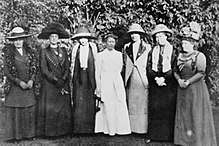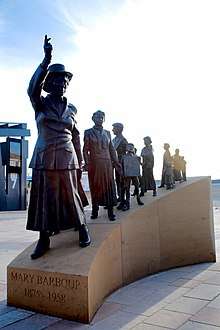Helen Crawfurd
Helen Crawfurd Anderson (9 November 1877 – 18 April 1954) was a Scottish suffragette, rent strike organiser, Communist activist, and politician. Born in Glasgow, she was brought up there and in the London area.
Helen Crawfurd | |
|---|---|
.jpg) | |
| Born | Helen Jack 9 November 1877 Glasgow, Scotland |
| Died | 18 April 1954 (aged 66) Dunoon, Scotland |
| Nationality | Scottish |
| Occupation | Politician, Activist, Suffragette |
| Spouse(s) | Alexander Montgomerie Crawfurd George Anderson |
Biography
Born Helen Jack at 175 Cumberland Street in the Gorbals area of Glasgow, her parents were Helen L Kyle and William Jack.[1] Her mother worked a steam-loom before she wed.[2] Helen's family moved to Ipswich while she was young. She later went to school in London and Ipswich before moving back to Glasgow as a teenager. Her father, a master baker,[1] was a Catholic, but converted to the Church of Scotland and became a conservative trade unionist.

Initially religious herself and a Sunday School teacher, she felt a call to be married at 21 to a 67-year-old Church of Scotland minister and family friend, the widower Alexander Montgomerie Crawfurd (29 August 1828 – 31 May 1914).[2][3][4][2][5] but he became increasingly radical.[6] Alexander died aged 85 at 17 Sutherland Street in Partick, Glasgow.
In 1944 Helen remarried, to widower George Anderson of Anderson Brothers Engineers, Coatbridge. He was a member of the Communist Party of Great Britain.[7] He died on 2 February 1952 and Helen died at Mahson Cottage, Kilbride Avenue, Dunoon, Argyll, aged 76.[8][9]
Political activity
Crawfurd first became active in the women's suffrage movement around 1900, then in 1910 during a meeting in Rutherglen.[10] Helen was jailed three times for "militant" political activity throughout her career as an activist.[11] In 1912, she smashed the windows of Jack Pease, Minister for Education, and received a one-month prison sentence. In March 1914, Helen was arrested in Glasgow when Emmeline Pankhurst was speaking, received another month in prison,[2] and went on an eight-day hunger strike.[10] After one more arrest, she left the WSPU in protest at its support of World War I and in 1914 she joined the Independent Labour Party (ILP).[2][6]

During the war, Crawfurd was involved with the Red Clydeside movement, including the Glasgow rent strikes in 1915 when she led the South Govan Women's Housing Association to resist rent increases and prevent evictions, alongside Mary Barbour, Mary Laird, Mary Jeff and Agnes Dollan. She had co-founded the Glasgow branch of the Women's International League [2]and become secretary of the Women's Peace Crusade.[12] On 23 July 1916, she organised the first demonstration of the Women's Peace Crusade, which was attended by 5,000 people.[13][14] She formed a branch of the United Suffragists in Glasgow.[15]
In 1918 she was elected as vice-chair of the Scottish division of the Independent Labour Party. Shortly afterwards, she became a founder member of the ILP's left-wing faction, which was campaigning for it to affiliate to the Communist International. Crawford went to Moscow in 1920 for the Congress of the Third Communist International and interviewed Lenin.[2] When the affiliation policy was defeated, she joined the new Communist Party of Great Britain, within which she served on the Central Committee and was involved with various journalistic projects. She also became secretary of Workers' International Relief.[6]
In 1919, Crawfurd was a delegate to the Congress of the Women's International League in Zurich.[16]
Crawfurd ran in 1921 as the first Communist Party Candidate in the Govan Ward.[17]
In 1927, Crawfurd was an official delegate to the Brussels International Conference against Oppressed Nationalities[18], at which the League against Imperialism was established. Crawfurd became a member of the Executive of the British Section. [19]
Crawfurd stood for the CPGB in Bothwell at the 1929 general election and Aberdeen North in 1931, but did not come close to election.[6]
During the 1930s, Crawfurd was prominent in the Friends of the Soviet Union. She unsuccessfully stood for Dunoon Town Council in 1938,[20] but she was elected as Dunoon's first woman Town Councillor shortly after the war,[10] retiring in 1947 due to poor health.[6][21]
Helen Crawfurd died in 1954.[2]
References
- "SR Birth Search for Helen Jack (Statutory Births 644/12 1466)". Scotland's People.
- Atkinson, Diane (2018). Rise up, women! the remarkable lives of the suffragettes. London: Bloomsbury. pp. 308, 532. ISBN 9781408844045. OCLC 1016848621.
- "OR Birth and Baptism Search CRAWFORD, ALEXANDER (O.P.R. Births 612/01 0020 0089 ST QUIVOX)". Scotland's People.
- "SR Death Search for Alexander Montgomerie Crawfurd (Statutory Deaths 644/22 0321)". Scotland's People.
- "SR Marriage Search for CRAWFORD, ALEXANDER M - JACK, HELEN (Statutory Marriages 490/00 0075)". Scotland's People.
- Ed. A. T. Lane, Biographical Dictionary of European Labor Leaders, Vol. 1, pp. 224–226.
- "SR Marriage Search Anderson George Crawford Helen COATBRIDGE OR OLD MONKLAND Lanark 652/02 0071". Scotland's People.
- "SR Death Search ANDERSON, GEORGE (Statutory Deaths 510/02 0002)". Scotland's People.
- "SR Death Search ANDERSON, HELEN (Statutory Deaths 510/01 0067)". Scotland's People.
- Leneman, Leah (2000). The Scottish Suffragettes. British Library: NMS Publishing Limited. pp. 58–61. ISBN 1-901663-40-X.
- Castells, Manuel, 1942- (1983). The city and the grassroots: a cross-cultural theory of urban social movements. Berkeley: University of California Press. ISBN 0-520-04756-7. OCLC 8929555.CS1 maint: multiple names: authors list (link)
- "The Peace Negitiations Memorial". Forward. 8 July 1916.
- Liddington, Jill (1984). The Life and Times of a Respectable Rebel: Selina Cooper (1864–1946). Virago.
- Wiltshire, Anna (1985). Most Dangerous Women: Feminist Peace Campaigners of the Great War. Pandora.
- "Suffrage in Glasgow". Votes for Women. 30 July 1915.
- "Women who have pledged themselves to work for the Prevention of all future wars". The Crusader. 6 June 1919.
- "HelenCrawfurd_GovanElectionPoster1921". Govan's Hidden Histories. 17 June 2015. Retrieved 2 July 2016.
- Ellison, John (2017). "The League against Imperialism (British Section)- A Hidden History". Communist Party History Group: Our History. 15 (vol 2 new series): 6 – via issuu.
- Ellison, John (2017). "The League against Imperialism (British Section) - A Hidden History". Communist Party History Group: Our History. 15 (vol 2 new series): 8 – via issuu.
- "Other burghs". The Scotsman. 2 November 1938.
- "Crawfurd Helen", Compendium of Communist Biography
| Political offices | ||
|---|---|---|
| Preceded by New position |
British Secretary of Workers International Relief 1921 – 1925 |
Succeeded by Jack Leckie |
| Party political offices | ||
| Preceded by New position |
National Women's Organiser of the Communist Party of Great Britain 1922 – 1924 |
Succeeded by Beth Turner |
.jpg)